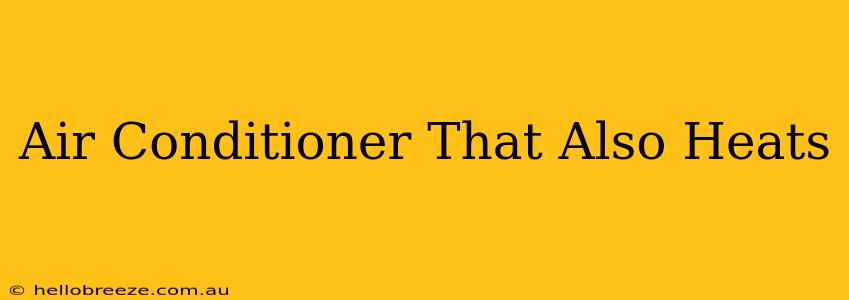Are you tired of juggling two separate systems for heating and cooling your home? A heat pump offers a convenient and often more energy-efficient solution. This comprehensive guide explores the world of air conditioners that also heat, focusing on the benefits, considerations, and everything you need to know before investing in a heat pump.
What is an Air Conditioner That Also Heats?
Essentially, an air conditioner that also heats is a heat pump. Unlike traditional heating systems that burn fuel to generate heat, heat pumps cleverly transfer heat from one place to another. In the summer, they extract heat from inside your home and release it outside, providing cooling. In the winter, they reverse the process, drawing heat from the outside air (even in relatively cold temperatures) and pumping it inside to warm your home.
Key Advantages of Heat Pumps:
- Energy Efficiency: Heat pumps are significantly more energy-efficient than traditional electric heating systems. They use less electricity to produce the same amount of heat, leading to lower energy bills.
- Dual Functionality: One system handles both heating and cooling, simplifying your HVAC setup and reducing maintenance needs.
- Eco-Friendly: Heat pumps produce fewer greenhouse gas emissions compared to systems that burn fossil fuels. This makes them a more environmentally responsible choice.
- Cost Savings: While the initial investment might be higher than a standard air conditioner or furnace, the long-term energy savings can lead to substantial cost reductions.
- Improved Indoor Air Quality: Some heat pumps incorporate features that improve air quality by filtering out dust and allergens.
Types of Heat Pumps:
Several types of heat pumps cater to diverse climates and needs:
- Air-Source Heat Pumps: These are the most common type, transferring heat between the indoor and outdoor air. They are suitable for a wide range of climates.
- Ground-Source (Geothermal) Heat Pumps: These utilize the stable temperature of the earth to transfer heat, resulting in even greater energy efficiency, particularly in areas with extreme temperature fluctuations. However, installation requires significant groundwork.
- Water-Source Heat Pumps: These use water bodies like lakes or wells as a heat source or sink. They are efficient but require access to a suitable water source.
Choosing the Right Heat Pump for Your Home:
Selecting the right heat pump involves considering several factors:
- Climate: The effectiveness of a heat pump decreases as the outside temperature drops. In extremely cold climates, a supplemental heating system might be necessary.
- Home Size and Insulation: The size and insulation of your home determine the required heating and cooling capacity of the heat pump. A professional assessment is recommended.
- Budget: Heat pumps come in a range of prices, from budget-friendly models to high-end systems with advanced features.
- Energy Efficiency Ratings: Look for high SEER (Seasonal Energy Efficiency Ratio) and HSPF (Heating Seasonal Performance Factor) ratings to ensure optimal energy efficiency.
Maintenance and Considerations:
Like any HVAC system, regular maintenance is crucial for the optimal performance and longevity of your heat pump. This includes:
- Annual Inspections: Professional inspections can identify potential issues early on, preventing costly repairs.
- Air Filter Changes: Regularly changing the air filter improves efficiency and air quality.
- Refrigerant Checks: Refrigerant levels should be checked periodically to ensure proper system operation.
In conclusion, a heat pump, or air conditioner that also heats, offers a compelling alternative to separate heating and cooling systems. By carefully considering your needs and seeking professional advice, you can choose a heat pump that provides comfortable, energy-efficient, and environmentally responsible climate control for your home. Remember to research reputable installers in your area to ensure a smooth installation and ongoing support.

